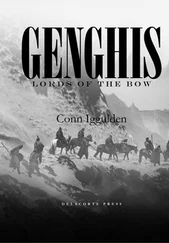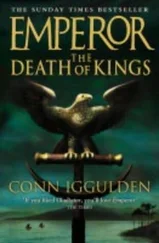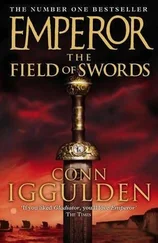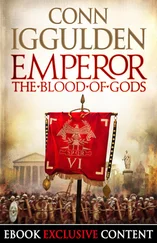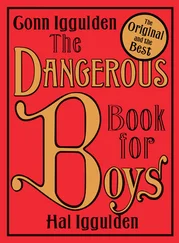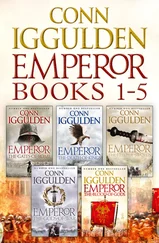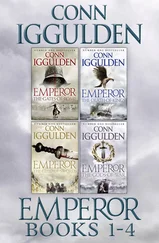Conn Iggulden - The Gods of war
Здесь есть возможность читать онлайн «Conn Iggulden - The Gods of war» — ознакомительный отрывок электронной книги совершенно бесплатно, а после прочтения отрывка купить полную версию. В некоторых случаях можно слушать аудио, скачать через торрент в формате fb2 и присутствует краткое содержание. Жанр: Исторические приключения, на английском языке. Описание произведения, (предисловие) а так же отзывы посетителей доступны на портале библиотеки ЛибКат.
- Название:The Gods of war
- Автор:
- Жанр:
- Год:неизвестен
- ISBN:нет данных
- Рейтинг книги:5 / 5. Голосов: 1
-
Избранное:Добавить в избранное
- Отзывы:
-
Ваша оценка:
- 100
- 1
- 2
- 3
- 4
- 5
The Gods of war: краткое содержание, описание и аннотация
Предлагаем к чтению аннотацию, описание, краткое содержание или предисловие (зависит от того, что написал сам автор книги «The Gods of war»). Если вы не нашли необходимую информацию о книге — напишите в комментариях, мы постараемся отыскать её.
The Gods of war — читать онлайн ознакомительный отрывок
Ниже представлен текст книги, разбитый по страницам. Система сохранения места последней прочитанной страницы, позволяет с удобством читать онлайн бесплатно книгу «The Gods of war», без необходимости каждый раз заново искать на чём Вы остановились. Поставьте закладку, и сможете в любой момент перейти на страницу, на которой закончили чтение.
Интервал:
Закладка:
Julius was so deep in his inner thoughts that he did not notice Tillius Cimber approach him, striding along the curved line of benches. Julius assumed the younger man had stumbled when he felt a hand grip the cloth of his toga, yanking it aside.
In an instant, rage spiked in him as the man held on. Cimber's face was rigid with effort and Julius gripped his fingers with both hands, twisting at them.
"What are you doing?" Julius shouted at his attacker, struggling to stand.
He saw faces turn toward him from the corners of his eyes and more men rush to his aid. Through his fury, he knew he had only to wait for Cimber to be dragged away. The punishment for daring to lay a hand on him was death, and he would not be merciful.
Cimber was young and strong, but Julius had weathered like an oak on a thousand miles of march. His arms shook with the strain, yet he could not break the deathless fingers that writhed against his neck.
More men clustered around on the benches, crying out as they came closer. Julius saw Suetonius draw a dagger, his face flushed with vicious excitement. The shock strained at his heart as he understood at last what was happening. Cimber smiled as he saw the realization come to the Dictator and he renewed his grip, holding Julius in place for Suetonius to strike.
Julius looked desperately around for anyone he could call. Where was Ciro? Brutus? Where was Octavian or Mark Antony? He bellowed as Suetonius gashed at him, the knife scoring a line of blood on his shoulder. Cimber's hold was broken by others who swarmed in to kill and Julius struck out blindly, yelling for help. He grunted as a knife sank into his side and was withdrawn to strike again.
A man fell across him, hindering the others. Julius was able to stand for a moment and raised his arm against a dagger slashing toward his neck. It sliced his hand and he cried out in agony, shoved back in his seat by the press of snarling men.
There was blood everywhere, staining their white togas and spattering their faces. Julius thought of his son and was terrified for what they would do to him. In his agony, he shoved one of his attackers backwards with fading strength. More knives punched into his legs as he kicked out in spasm.
He did not stop calling for help, knowing he could survive even the worst of the wounds. If Octavian could be summoned, he would strike fear into the animals that screamed and yelped around him in a frenzy.
Two of them held him by shoulders slippery with blood. Hot liquid bubbled from the corner of his mouth as his strength vanished. He could only look up in despair as they panted into his face, close enough to smell their breath.
"Wait," he heard a voice say, somewhere close.
The bloody hands shoved Julius against the back of his seat and he turned in an agony of hope to see who had stopped them.
Brutus walked across the central floor of the theater, his hands clasped behind his back. Even as Julius felt relief, he saw his old friend too carried a blade in his hand, and he slumped brokenly. Blood poured from his wounds and his vision seemed to sharpen as every sense screamed to live. He felt the hands of his enemies fall away, but he could not move or fight them any longer.
"You too, Brutus?" he said.
Brutus stepped into the line of benches and raised his knife up to Julius's face. His eyes held a great sadness and a triumph Julius could not bear to witness.
"Yes," Brutus replied softly.
"Then kill me quickly. I cannot live and know this," Julius said, his voice a whisper.
The other men stood back in awe, seeing the blood they had released. Julius did not look at them. Slowly, without dropping his gaze from Brutus, he reached to the twisted folds of his toga and drew it slowly upwards.
Brutus watched in silence as Julius showed his contempt for them all. He bowed his head under the toga, folding his shaking hands into the cloth. Then he sat perfectly still and waited for death.
Brutus showed his teeth for an instant, then shoved his knife through the cloth, finding the heart. The tableau broke as the others joined him, stabbing and stabbing at the small figure until it slumped to the side and the last of life was gone.
The susurration of panting breath was the only sound in the world as Brutus looked around the men in the echoing theater. Every eye was on the body that lay between the benches, limp and slick with blood. The dark liquid stained their faces and arms and rested in tiny droplets in their hair.
"He's dead at last," Suetonius murmured, shaking as the draining frenzy left him weak and dazed. "What happens now?"
The men who had come so far looked to Brutus for an answer.
"Now we walk out," Brutus said. His voice shook. "We walk. We go to the Senate house and we tell them what we have done. We have cut the tyrant out of Rome and we will not go in shame."
He saw Suetonius begin to wipe his knife clean and Brutus reached out a hand, stopping him.
"We will not hide the marks. Let the blood show the honor of those with courage to stand against a tyrant. This is how we have saved the Republic. Let it show. Now he is gone, Rome can begin to heal."
His eyes glittered as he looked down at the figure of the man he had known and loved.
"We will honor him in death," he said, almost too quietly to hear.
Those closest to the doors began to walk away and Brutus went with them. The rest followed, glancing back at the scene, as if to reassure themselves of its reality.
They walked red-handed on the ancient streets of Rome and they walked with pride.
HISTORICAL NOTE
Gaius Julius Caesar is remembered for much more than being an extraordinary general. It is true that there are few military leaders who could have equaled his strategic skill or charismatic leadership, but that is only a part of the tale. Republican Rome may have eased into empire without Julius Caesar, but it could also have torn itself apart. In one of the hardest schools in history, Caesar rose to preeminence, finally crushing Pompey at Pharsalus. His life was the bridge between two eras of history; the catalyst for empire.
Throughout his career, he showed a fine understanding of politics, power, and manipulation. I will not say he invented propaganda, but he must surely be one of its greatest and earliest exponents. Undermining Pompey through public displays of clemency was a deliberate policy. As Julius wrote in a letter, "Let this be a new way of gaining victory; let us secure ourselves through mercy and magnanimity!"
Pompey never understood the technique, though Cicero clearly saw through at least part of it. He referred to the policy as "insidious clemency" and said that "whatever evil he refrains from, arouses the same gratitude as if he had prevented another from inflicting it."
Pompey was outmatched from the start of the civil war, when he demanded the Gaul general return to Rome without the support of his legions. Caesar spent a night of soul-searching on the river Rubicon where he debated whether the loss of life resulting from a civil war would be worth his own. With characteristic self-belief, he decided it would be and launched a lightning strike south, at such a speed that Pompey was caught completely by surprise. He could not defend the city and even forgot to empty the treasury in his haste to leave. Not that it was needed. The vast sums of gold Caesar brought back from Gaul devalued the Roman aureus by an astonishing thirty percent.
The incident on the feast of Bona Dea was as I have described it, including the fact that Publius dressed as a woman to escape detection. Publius was actually found innocent of adultery by a court, but Caesar divorced his wife anyway, saying that "Caesar's wife must be above suspicion." Having an heir was no doubt increasingly important to him and he would have understood the need for a son's legitimacy to be beyond question.
Читать дальшеИнтервал:
Закладка:
Похожие книги на «The Gods of war»
Представляем Вашему вниманию похожие книги на «The Gods of war» списком для выбора. Мы отобрали схожую по названию и смыслу литературу в надежде предоставить читателям больше вариантов отыскать новые, интересные, ещё непрочитанные произведения.
Обсуждение, отзывы о книге «The Gods of war» и просто собственные мнения читателей. Оставьте ваши комментарии, напишите, что Вы думаете о произведении, его смысле или главных героях. Укажите что конкретно понравилось, а что нет, и почему Вы так считаете.



